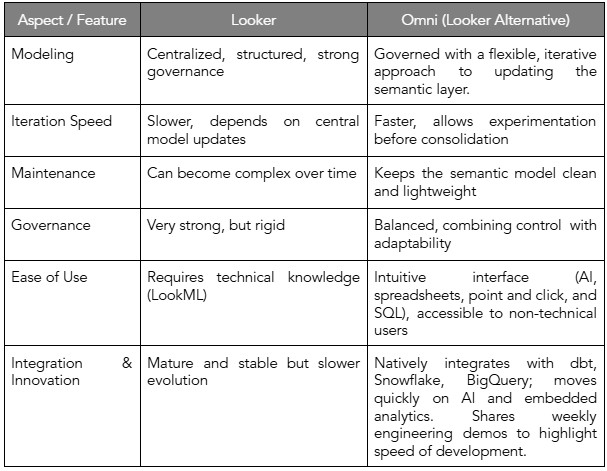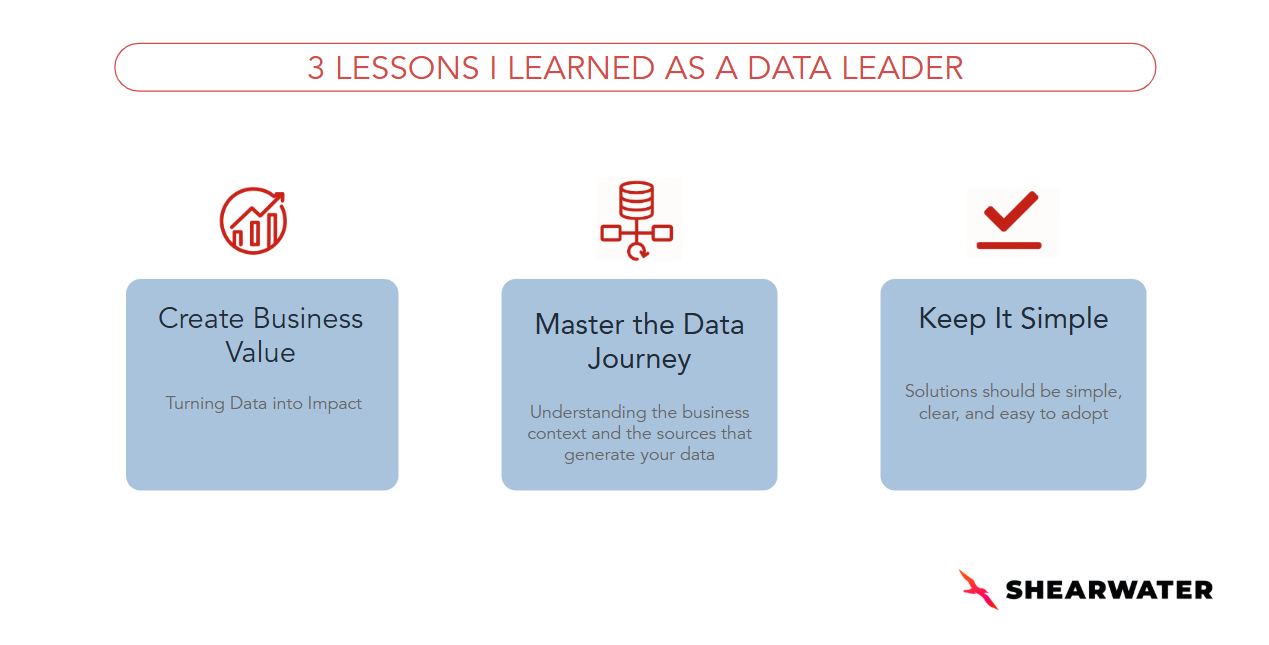Thinking about a Looker alternative? You’re not alone. Many companies consider Looker as a powerful BI platform when shaping their long-term data strategy. Its robust semantic modeling with LookML and ability to empower business users to explore data independently set an important standard in the BI space. But choosing the right tool requires exploring alternatives to see which platform best fits your business needs today and in the future.
My Experience with Looker and Data Analytics
Over the past 17 years, I’ve helped hundreds of companies navigate their data and analytics challenges, from strategy to implementation. I was part of the early team at Looker, later acquired by Google, and went on to lead Looker Sales Analytics at Google Cloud. Before that, I worked in Consumer Seller Analytics at eBay and as a Senior Analyst in Tracking and Attribution Management.
Throughout this journey, I’ve spent a lot of time in the trenches of BI implementations and migrations. That hands-on experience has shown me how different tools and methodologies perform, not just in theory but in the day-to-day reality of fast-growing businesses, shifting priorities, and evolving data teams.
This perspective led me to co-found Shearwater Data, a consultancy focused on helping companies get the most out of BI platforms with semantic layers. We’ve worked with a wide range of tools like Sigma, Zenlytics, Omni, and of course, Looker. That range of experience has given us a clear view of what works in practice and where things tend to break down.
From everything we’ve seen, two platforms consistently stand out for how they bring the semantic layer close to the consumption layer to enable broad self-service: Looker and Omni Analytics. Both have their strengths, but the differences between them can significantly impact scalability, usability, and long-term maintainability of your BI environment.
Looker
Looker is well-known for its structured, opinionated approach to building a BI model. It’s designed to create a common set of metrics across an organization, ensuring consistency and accuracy in reporting.
The model, defined in LookML, lays down clear paths for how data should be understood and used, which is particularly valuable in large organizations where maintaining a single source of truth and governance are critical.
However, as use cases evolve and become more specific, the requirement to push the vast majority of business logic into LookML becomes counterproductive. LookML must be defined in code, which means data teams often become the bottleneck for one-off models or custom metrics that don’t fit neatly into the existing framework. Over time, this can lead to a model that’s cluttered and difficult to maintain, undermining the very consistency and clarity it was meant to provide.
Omni Analytics: The Best Looker Alternative for Flexible BI and Embedded Analytics in 2025
Omni takes a different approach, one that might be more in tune with the natural flow of how businesses evolve. Rather than enforcing a strict model from the start, Omni empowers users to build metrics and add business context on the front end, which can then be promoted into a shared semantic layer once there is consensus. This creates a balance: governance and consistency where it matters, but agility where it’s needed most.
This model is especially valuable for businesses that are growing or evolving quickly. By enabling business users to contribute metrics and business knowledge themselves, the semantic model can evolve alongside the business without the data team becoming a bottleneck. The data team can still manage the model with software development workflows like version control and a git integration, so the core semantic model stays clean and lightweight while enabling innovation and self-service across business teams.
Looker vs. Omni Analysis: Top BI and Analytics Tools to Consider
When comparing Looker with Omni Analytics, we see fundamental differences. Looker relies on a rigid model, where most business logic must be incorporated directly into LookML. While this ensures strong governance, it also slows iteration since every change depends on central model updates, often leading to clutter and complexity over time. In this setup, the business must adapt to the model, which can limit agility for fast-moving teams.
Omni, on the other hand, takes a more flexible route. Logic begins at the front end and is only promoted to the semantic layer once validated and consolidated. This process allows faster experimentation, reduces manual work, and keeps the model clean and lightweight. Governance strikes a balance—preserving data integrity without stifling innovation. Ultimately, the model evolves in line with real business needs, accelerating adoption and ensuring users can get fast, accurate answers.

Why Omni is Emerging as a Modern Alternative to Looker in 2025
The side-by-side comparison above makes it clear why Omni is increasingly being chosen as a modern Looker alternative. It retains what made Looker powerful — semantic modeling and governance — but avoids many of the trade-offs that frustrate fast-growing organizations.
In addition, Omni is addressing gaps that have become more pressing in today’s BI landscape:
- Faster time-to-value with less upfront modeling, enabling rapid experimentation and iteration.
- Flexible semantic layer and iterative modeling that evolves with business needs instead of forcing top-down rigidity.
- True self-service analytics that empowers non-technical users to explore, calculate, and build reports independently.
- Seamless Integration with the Modern Data Stack: Omni integrates natively with tools like dbt, Snowflake, and BigQuery. This reduces the need to rework models in proprietary languages and simplifies pipeline management across platforms.
- Better Support and User Experience: According to user reviews, Omni consistently outperforms Looker when it comes to usability, support responsiveness, and interface design.
Innovation pace, particularly around AI and embedded analytics.
The Bottom Line: Omni is The Best Alternative to Looker
Looker remains a trusted platform that set the standard for how semantic modeling can bring order and consistency to enterprise analytics. Its strengths in governance and reliability are why so many organizations continue to rely on it.
That said, companies looking for greater flexibility, faster iteration, and a modern user experience often find that Omni represents the natural next step. At Shearwater, we see Omni not simply as an alternative to Looker, but as an evolution—one that builds on Looker’s best qualities while addressing many of its limitations.
For businesses that are growing or rapidly changing, it may be beneficial to let business requirements drive the logic that gets shared rather than starting with an opinionated model. This approach allows faster iteration and results in a cleaner, more approachable BI model.
Additionally, many organizations are currently considering migrations due to cost, support issues, or the desire to partner with a company that is more focused on innovation. For those contemplating a migration from Looker or other solutions, we view Omni's approach not as a trade-off but as a significant innovation. It maintains what made Looker great while offering a better overall experience.
At Shearwater, we’ve already helped several clients make this transition from Looker to Omni, including Zapnito and Button.
“Omni stood out to us due to its flexibility – it allowed the team to build not just from a centralized, shared data model, but also directly from SQL queries and Excel-like functions. This naturally fulfilled our need for faster, more impactful BI development. We believed its functional similarity to Looker would also significantly reduce migration effort and help us avoid a steep learning curve for users. Moreover, Omni offered substantial cost savings, freeing up resources for reinvestment into R&D and product innovation”. — Max Clinkingbeard, Senior BI Engineer at Button
-
Looking for help with a Looker migration or testing Omni as your BI tool?
➡️ Connect with Shearwater’s team of experts to design the right BI strategy for your team.



.png)


.png)